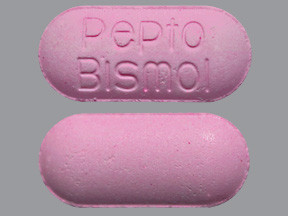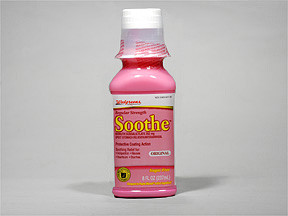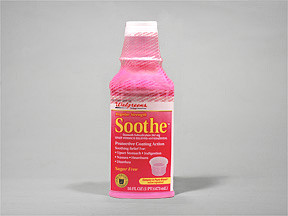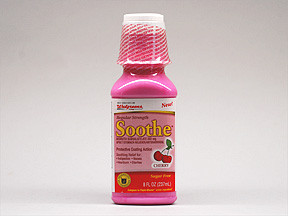BISMUTH SUBSALICYLATE - ORAL
PHONETIC PRONUNCIATION: (BIZ-muth SUB-sa-LIS-i-late)
COMMON BRAND NAME(S): Pepto-Bismol, Pink Bismuth
GENERIC NAME(S): bismuth subsalicylate
Uses
USES: This medication is used to treat occasional upset stomach, heartburn, and nausea. It is also used to treat diarrhea and help prevent travelers' diarrhea. It works by helping to slow the growth of bacteria that might be causing the diarrhea. This product should not be used to self-treat diarrhea if you also have a fever or blood/mucus in the stools. These could be signs of a serious health condition. Consult your doctor promptly for proper evaluation and treatment if you have these symptoms. This medication is used under a doctor's direction with other medication to treat stomach ulcers caused by a certain bacteria (Helicobacter pylori). Do not use this medication to self-treat ulcers. Bismuth subsalicylate is a salicylate. Salicylates can cause serious bleeding problems when used alone in patients with ulcers. Check the ingredients on the label even if you have used the product before. The manufacturer may have changed the ingredients. Also, products with similar names may contain different ingredients meant for different purposes. Taking the wrong product could harm you.
How to use BISMUTH SUBSALICYLATE - ORAL
HOW TO USE: Take this medication by mouth, usually as needed, as directed by the product package or as directed by your doctor. The dosage is based on your age, medical condition, and response to treatment. Do not increase your dose or take this drug more often than directed. Do not take more of this medication than recommended for your age. There are many brands and forms of bismuth subsalicylate available. Read the dosing instructions carefully for each product because the dosing directions may be different between products. If you are using the chewable tablets, chew each tablet well and swallow. If you are using the liquid form of this medication, shake the bottle well before each dose. Measure the dose carefully using a special measuring device/cup. Do not use a household spoon because you may not get the correct dose. This medication may react with other medications (such as tetracycline antibiotics, chloroquine), preventing them from being fully absorbed by your body. Talk with your doctor or pharmacist about how to schedule your medications to prevent this problem. If your doctor has directed you to use this medication daily, use it regularly to get the most benefit from it. To help you remember, take it at the same time(s) each day. Tell your doctor if your condition persists or worsens. If you are taking this medication for diarrhea, tell your doctor if your diarrhea lasts more than 2 days.
Side Effects
Precautions
Interactions
Overdose
Images
Reviews
Disclaimer
IMPORTANT: HOW TO USE THIS INFORMATION: This is a summary and does NOT have all possible information about this product. This information does not assure that this product is safe, effective, or appropriate for you. This information is not individual medical advice and does not substitute for the advice of your health care professional. Always ask your health care professional for complete information about this product and your specific health needs.





No Reviews Yet